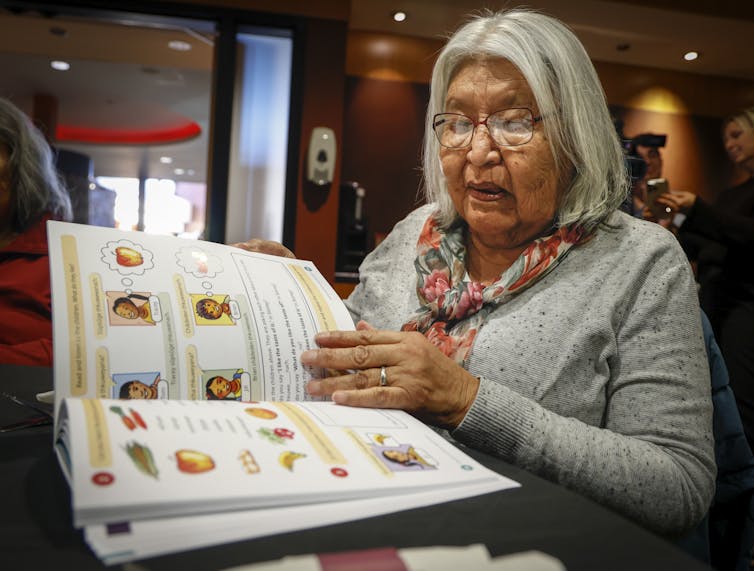
As we look ahead to National Indigenous Peoples Day, guest host Prof. Veldon Coburn speaks with Prof. Frank Deer, Canada Research Chair and associate dean of Indigenous Education at the University of Manitoba to tackle the issue of disappearing Indigenous languages and delve into how much more needs to be done to revitalize them and why doing so is critical.
Language, if we are not thinking about it, can be just a way to get from place A to B, a way to order lunch or a way to pass an exam.
But language is much more than a way to communicate with words. This is especially true if you have had your language forcibly removed from you, like the thousands of Indigenous children who survived Canada’s colonial assimilation project.
Languages hold within them philosophies, worldviews, culture and identity.
Language also has a lot to do with our relationships — how we relate to other people, to our families, to our ancestors and to the natural environment.
These are precisely the aspects of Indigenous life that the Indian Residential School system was designed to destroy.
Last year, the United Nations acknowledged the importance of Indigenous languages by declaring the decade ahead to be the International Decade of Indigenous Languages.

But long before the UN declaration, First Nations, Inuit and Métis peoples have been pushing to revitalize more than 70 Indigenous languages across Canada.
In 2019, the Indigenous Languages Act was passed by the government of Canada.
Still, progress — and redress — have been slow to come.
In this special episode of Don’t Call Me Resilient, Guest Host, Prof. Veldon Coburn speaks with Prof. Frank Deer, Canada Research Chair and associate dean of Indigenous Education at the University of Manitoba. They tackle the issue of disappearing Indigenous languages and delve into how much more needs to be done to revitalize them and why doing so is critical.

This week’s episode was produced in collaboration with IndigiNews
Thank you to Eden Fineday, publisher at IndigiNews, and Susannah Schmidt, education and arts editor at the Conversation Canada who contributed to this episode
Listen and Follow
You can listen to or follow Don’t Call Me Resilient on Apple Podcasts, Google Podcasts, Spotify or wherever you listen to your favourite podcasts.
We’d love to hear from you, including any ideas for future episodes. Join The Conversation on Twitter, Facebook, Instagram and TikTok and use #DontCallMeResilient.

Resources
As 1st language Kanien'kéha speakers dwindle, communities unite to revitalize the language by Candace Maracle (CBC)
New Indigenous language podcast hopes to help revitalize, preserve languages by Leanna Sanders (APTN News)
First Nations organizations going to court over Quebec’s French language reforms by Pierre Saint-Arnaud (CBC)
Mohawk scholar believes experiential learning provides a deeper appreciation for the land: Meet Dr. Brian Rice
Dorothy Lazore: Interview by Gerald L. Hill (Indigenous Languages Institute)
Aunty Eden’s Weekly Cree Lessons by Eden Fineday (IndigiNews)
From The Conversation archives
À lire aussi : Ancestral languages are essential to Indigenous identities in Canada
À lire aussi : To revitalize Indigenous communities, the Residential School settlement must prioritize language education
À lire aussi : Indigenous spiritual teaching in schools can foster reconciliation and inclusion
À lire aussi : Fishing with Elders builds these children’s Oji-Cree language, cultural knowledge and writing
À lire aussi : National Indigenous Languages Day: Keeping languages thriving for generations to come
This article was originally published on The Conversation. Read the original article.







